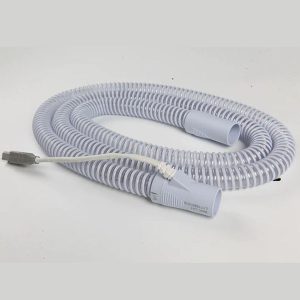Using a heated CPAP hose offers several benefits for individuals using CPAP therapy:
- Prevents Rainout: Heated CPAP tubing helps prevent rainout, a common issue where condensation forms in the tubing, leading to discomfort and potential disruption of therapy.
- Enhances Comfort: The warmth provided by heated tubing increases comfort during CPAP therapy, reducing the sensation of breathing in cold air and minimizing nasal congestion .
- Reduces Bacterial Growth: Heating the tubing helps prevent the buildup of moisture, which can harbor bacteria and mold. This reduces the risk of respiratory infections and ensures cleaner air delivery .
- Maintains Humidity: Heated tubing maintains optimal humidity levels throughout the CPAP system, preventing dryness and irritation in the airways and throat.
- Improves Therapy Adherence: By providing a more comfortable and consistent therapy experience, heated CPAP tubing increases adherence to CPAP treatment, leading to better health
- Customizable Settings: Many heated tubing systems offer customizable heat settings, allowing users to adjust the temperature according to their preferences and environmental conditions.
- Year-Round Benefits: While particularly beneficial in cold or dry climates, heated tubing provides advantages year-round by maintaining optimal humidity levels regardless of external conditions.
- Compatible with Humidifiers: Heated tubing is often compatible with CPAP humidifiers, ensuring consistent warmth and moisture levels throughout the entire respiratory system.
- Enhances Sleep Quality: By reducing disturbances such as rainout and discomfort, heated CPAP tubing contributes to improved sleep quality, allowing users to experience more restful nights
- Minimizes Condensation: Heated tubing effectively minimizes condensation within the CPAP system, preventing water buildup that can lead to mask leaks and discomfort during therapy

In summary, using a heated CPAP hose offers multiple benefits, including preventing condensation, enhancing comfort, reducing rainout, improving therapy adherence, providing customizable settings, and preventing mold and bacteria growth. These advantages contribute to a more effective and comfortable CPAP therapy experience for individuals with sleep apnea.


